What Are The Steps In A Skin Care Routine At Night?
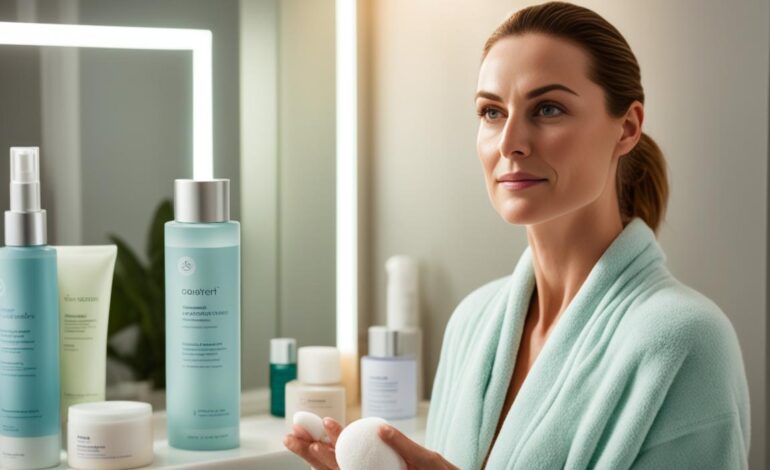
Skin Care Routine At Night : Having a solid nighttime skincare routine can do wonders for your skin. During the day, the skin works hard to repair itself. But at night, it really gets the chance to shine.
By following a specific routine before bed, you help your skin a lot. This approach allows you to target skin issues. It also helps the skin rejuvenate naturally. The result? You wake to a fresh, glowing face.
Key Takeaways
- A nighttime skincare routine is crucial for supporting the skin’s natural repair and regeneration processes.
- The key steps include makeup removal, cleansing, toning, treatment with active ingredients like retinol, hydrating with creams and oils, and protecting the skin’s barrier.
- Incorporating these steps can help address various skin concerns, from acne and fine lines to dullness and uneven texture.
- Consistency is key when it comes to a nighttime routine, as the cumulative effects of these steps can lead to long-term skin health and radiance.
- Tailoring the routine to your specific skin type and needs is essential for optimizing the results.
Importance of a Nighttime Skin Care Routine
A nighttime skincare routine is just as crucial as in the morning. Our skin works to repair itself while we sleep. This repair involves releasing important hormones like melatonin.
Also Read : What Is A Simple Skin Care Routine For Beginners?
At night, our skin uses these hormones to rejuvenate. It’s the best time to tackle skin issues.
What Happens to Skin While We Sleep?
Sleep helps our skin in many ways. Melatonin, known for helping us sleep, acts as a strong antioxidant. It fights off free radicals and protects our skin from aging.
Also Read : How Can I Build A Budget friendly Skin Care Products List?
Human growth hormone is also at work. It boosts the turnover of our skin cells. This process gets rid of dead cells and brings in new ones.
As we sleep, our skin also loses a lot of moisture. Adding back moisture through products like hyaluronic acid is very important. This is also the best time for products with retinol and acids to work deeply in our skin. They help with issues like wrinkles and acne.
Also Read : What Fruits Are Good For Dry Skin?
“Nighttime is the optimal time to use potent treatments like retinol, exfoliating acids, and overnight masks to maximize their efficacy.”
A well-thought-out nighttime skincare plan taps into this repair work. It keeps your skin looking fresh and ready for every day.
Also Read : Which Vegetable Is Best For Glowing Skin?
Differences Between Morning and Nighttime Routines
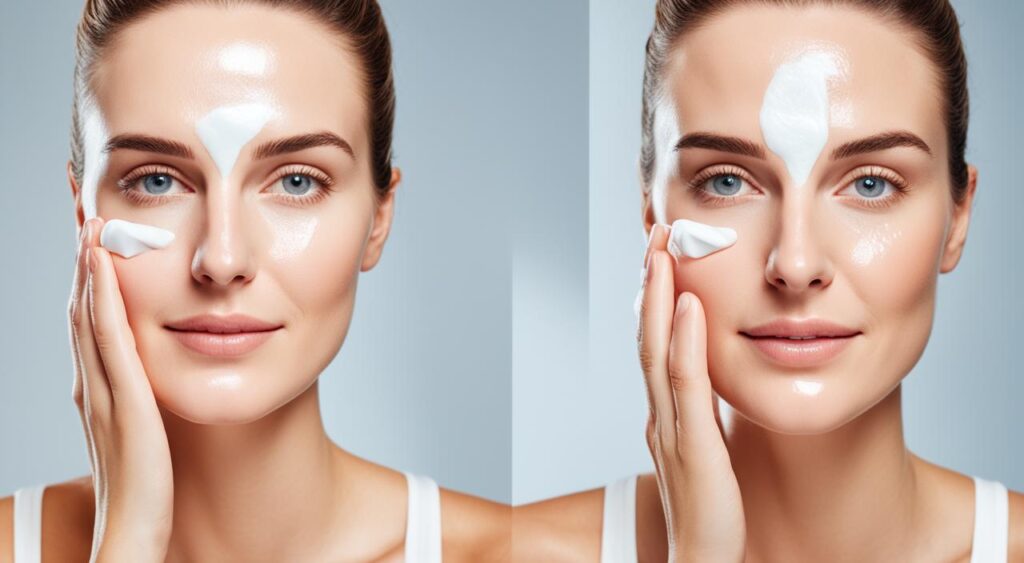
Morning and nighttime skin routines are important but different. Mornings are about protecting the skin. Nighttimes focus on repairing it.
Also Read : What Are The Best Natural Remedies For Eczema?
In the morning, you’ll start with cleansing, toning, and applying serums. These protect your skin from pollution and the sun. Then, moisturizer and sunscreen keep your skin hydrated and safe.
At night, it’s time to wash off the day’s dirt and makeup. This clears the way for products like retinol and gentle exfoliators. These help your skin repair and renew while you sleep.
The order of products matters, too. At night, lighter products go on first. Heavier creams come next to seal everything in. This way, your skin gets the full benefit of your skincare routine.
“Consistent, tailored morning and nighttime routines are essential for maintaining healthy, balanced skin.”
Knowing what your skin needs will help you make the best routine. This way, you can take care of your skin’s needs every day and over time.
| Morning Routine | Nighttime Routine |
|---|---|
|
|
Step 1: Makeup Remover and Cleanser
The starting point for a great nighttime skincare routine is taking off makeup, dirt, and oil. Use an oil-based makeup remover or cleansing balm to get rid of waterproof makeup and sunscreens. Then, a water-based cleanser clears out any other dirt. This is called double cleansing and makes sure your skin is really clean.
If you have oily skin, an oil-free makeup remover or micellar water might be best. They won’t block your pores. But, if your skin is dry or sensitive, a creamy cleansing balm will help keep it hydrated. Whatever you pick, gently rub it into your skin and wash off with warm water.
“Double cleansing is the key to a truly effective nighttime cleansing routine. It ensures your skin is left clean, fresh, and ready to absorb the rest of your products.”
Taking off makeup and double cleansing well is crucial. It stops pores from getting clogged, prevents breakouts, and fights aging. This makes the rest of your nighttime skin care routine work even better.
Step 2: Hydrating Toner
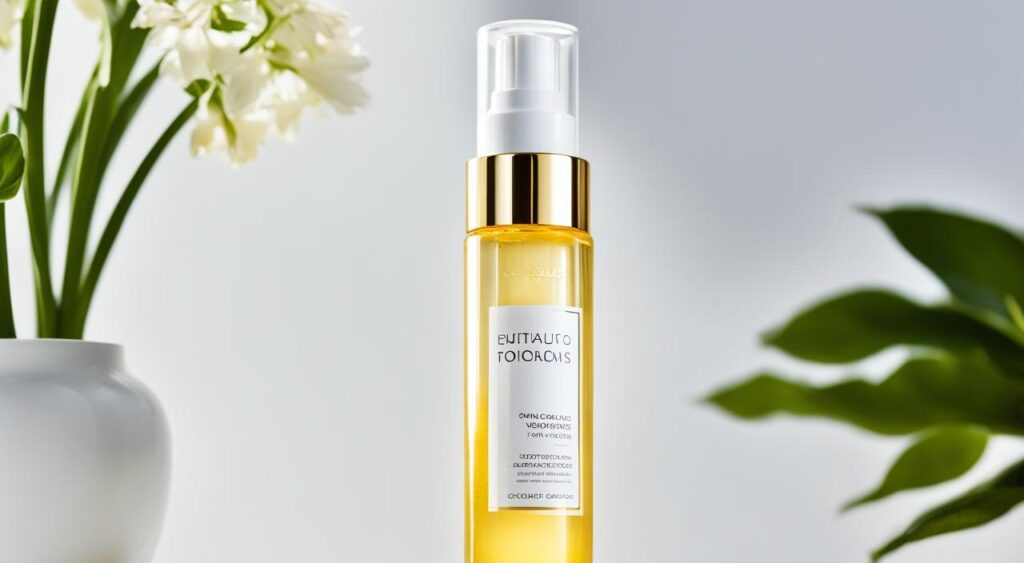
After you cleanse your skin, a hydrating toner plays a vital role in your nighttime routine. It fixes your skin’s pH balance and gets it ready for more products. No matter your skin type, you can find toners that suit your needs.
For dry or dehydrated skin, choose toners with rosewater, glycerin, or hyaluronic acid. These ingredients deeply moisturize your skin. So, it becomes soft and ready for other products. If your skin is oily, go for a toner with witch hazel or salicylic acid. These will help reduce shine and refine your pores.
If you have normal or combination skin, opt for gentle, alcohol-free toners. They help get rid of makeup leftovers without harming your skin. You can apply toner with a cotton pad or by gently patting it. This step ensures your skin absorbs the following products well, maximizing the benefits of your toner in nighttime routine.
| Skin Type | Recommended Toner Ingredients |
|---|---|
| Dry/Dehydrated | Rosewater, Glycerin, Hyaluronic Acid |
| Oily/Acne-Prone | Witch Hazel, Salicylic Acid |
| Normal/Combination | Gentle, Alcohol-Free |
Using a hydrating toner at night is key to better skin absorption. Whether it’s toning at night with rosewater or a mattifying toner for toner for oily skin, this step can vastly improve your skin health.
Skin Care Routine at Night
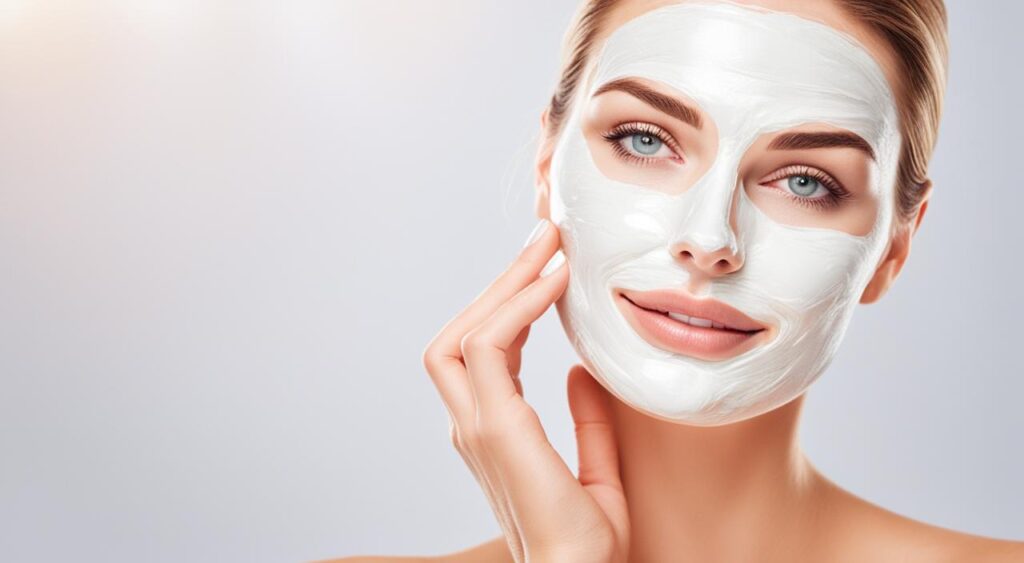
Nighttime is perfect for using strong skin products. Retinol is great for fighting aging, acne, and uneven skin. It helps make new skin cells and more collagen but use it at night because it makes skin sun-sensitive.
Step 3: Retinol or Exfoliating Treatment
If retinol is new to you, start with a small amount. This helps you avoid skin irritation. At night, using exfoliating treatments with AHAs can clear dead skin, open up pores, and make skin clearer. Apply them after washing and toning, but before thick creams.
When you add retinol or chemical exfoliants to your night routine, pay attention to your skin. You might need to change how often you use them. This could be using them only a few times a week.
| Active Ingredient | Benefits | Potential Irritation |
|---|---|---|
| Retinol | Improves signs of aging, acne, and uneven skin tone | Increased sun sensitivity, dryness, redness |
| Glycolic Acid | Sloughs off dead skin cells, unclogs pores, brightens | Tingling, dryness, irritation for sensitive skin |
| Lactic Acid | Gentle exfoliation, improves hydration and texture | Minimal irritation, suitable for sensitive skin |
Adding retinol or exfoliants to your nighttime regimen can help a lot. It improves skin health and how it looks. Go step by step and see what your skin likes to reach your goals.
Step 4: Eye Cream or Balm
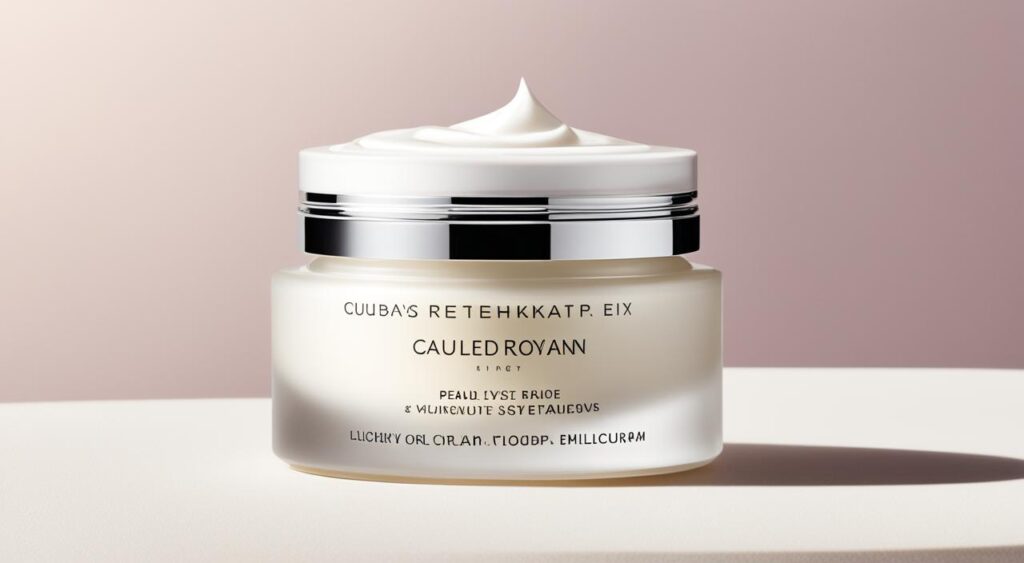
As we get older, the skin around our eyes shows more signs of age. These can be fine lines, wrinkles, or dark circles. Adding an eye cream or balm to your nightly skin routine can help. It addresses these issues and feeds the eye area.
When picking an eye treatment, choose products with moisturizing elements like hyaluronic acid, calming peptides, and good-for-you antioxidants such as vitamin C or vitamin E. These key ingredients enhance how your eyes look. They also offer direct care.
Want a stronger option? Try an anti-aging eye cream with retinol. This potent blend boosts collagen and cell renewal. Your eye area will look more lively and refreshed.
To apply your nighttime eye cream, softly pat it around your eye’s bone with your ring finger. Stay away from the very edge of your eye. This gentle touch ensures the cream soaks in well without harming the delicate skin.
Making an eye cream or balm part of your nightly routine isn’t complicated. It’s a powerful approach to addressing age signs and maintaining the best eye look. Regular care with this step can make you look younger and more energized.
Step 5: Spot Treatment (Optional)
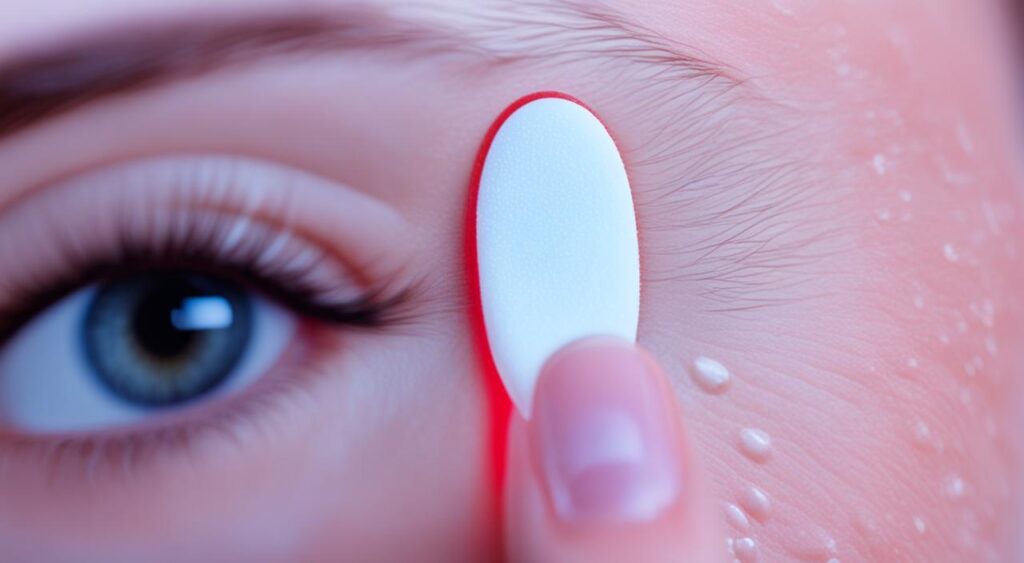
If you’re facing blemishes or dark spots, try a spot treatment at night. These treatments are strong and work directly on skin issues. So, targeted products can help a lot.
For pimples, pick spot treatments with benzoyl peroxide or salicylic acid. They fight swelling and dry up acne. If dark spots bother you, go for products with hydroquinone or kojic acid. These can lighten the skin.
Use these products only at night because they can make your skin sensitive to the sun. Apply them just on the spots. Don’t use them all over your face. Then, let them soak in before putting on moisturizer.
“Incorporating a targeted spot treatment into your nighttime routine can be a game-changer in addressing specific skin concerns, whether it’s blemishes, acne, or hyperpigmentation.”
Spot treatments are a strong part of skin care, but they need to be used carefully. Take care to use them right to avoid any bad effects. Targeting your skin issues can lead to a brighter, clearer face.
Step 6: Night Cream or Moisturizer
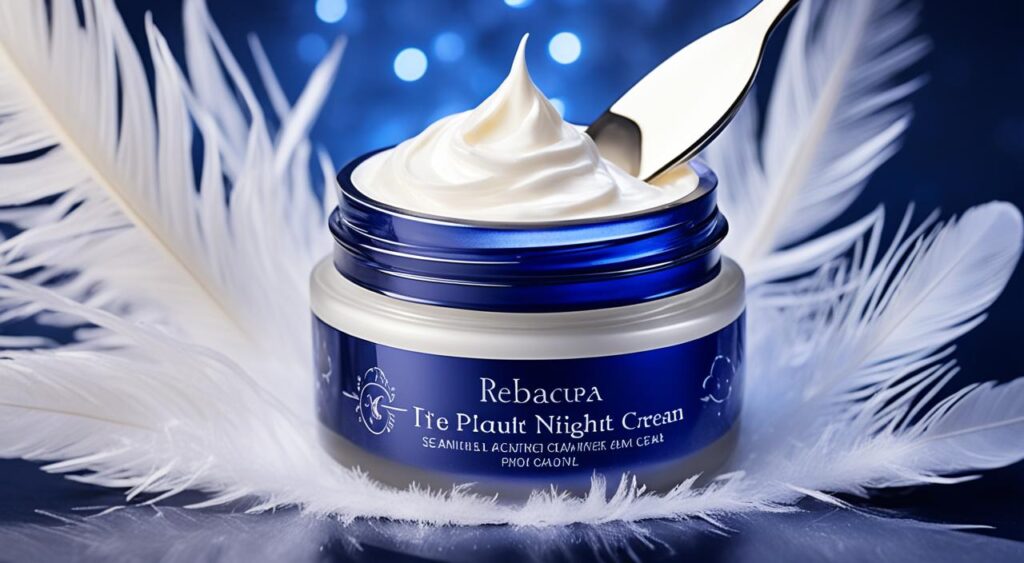
Hydration is key at the end of your bedtime skincare. Pick a night cream or moisturizer that soothes your skin. It should have good stuff like ceramides, shea butter, and glycerin. These keep your skin’s shield strong.
If your skin is oily or tends to break out, choose a light, gel moisturizer. This will help avoid blocked pores. For any skin, apply the moisturizer by moving up on your face and neck. Doing this boosts blood flow and lets your skin soak in the good stuff better. The night cream or moisturizer then locks in the benefits of the other products you used.
| Skin Type | Recommended Night Cream or Moisturizer |
|---|---|
| Dry/Dehydrated | Rich, creamy night cream with nourishing ingredients |
| Oily/Acne-prone | Lightweight, gel-based moisturizer |
| Normal/Combination | Balanced night cream or moisturizer |
“A good night cream or moisturizer is the foundation of a effective nighttime skincare routine. It seals in all the hard work you’ve done earlier in the routine.”
Adding a nourishing night cream or moisturizer caps off your nighttime skincare. It’s the final touch for a radiant look in the morning.
Step 7: Facial Oil (Optional)
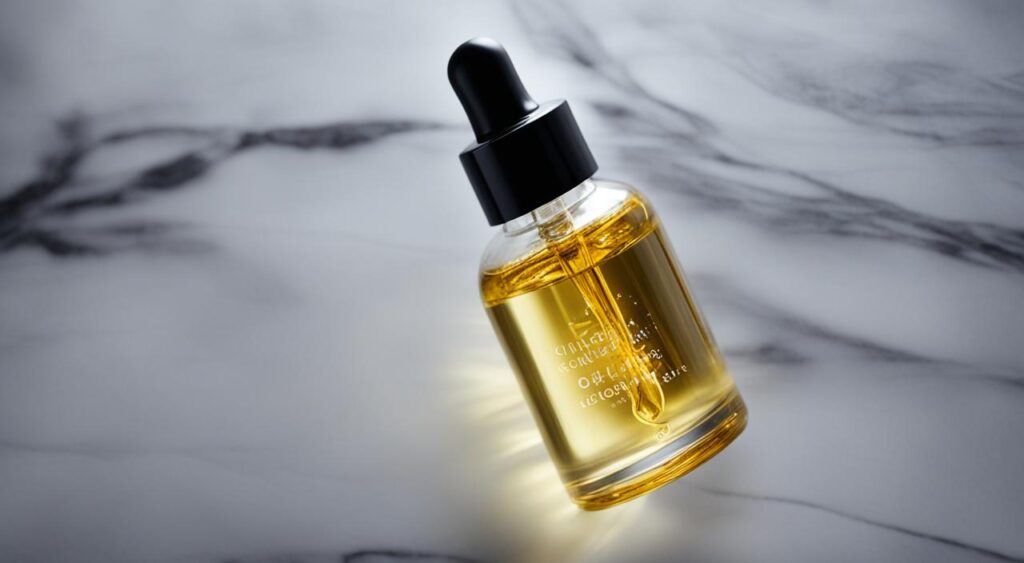
Adding a facial oil at night can really boost your skin. Oils like marula, argan, and rosehip are full of good fats and antioxidants. These protect your skin, keep it moist, and help in repairs. They are perfect for very dry, dehydrated, or older skin.
Benefits of Using Facial Oil at Night
At night, massage the facial oil well into your skin. These oils are thicker and work best as the last step before bed. Here’s why using face oil at night is great:
- Deeply hydrates and nourishes the skin
- Strengthens the skin’s protective barrier
- Supports the skin’s natural repair processes
- Provides a long-lasting, occlusive layer to lock in moisture
- Suitable for dry, dehydrated, and mature skin types
Using facial oil at night makes your night routine even better. Your skin gets extra hydration and care while you sleep.
Step 8: Overnight Mask (Optional)
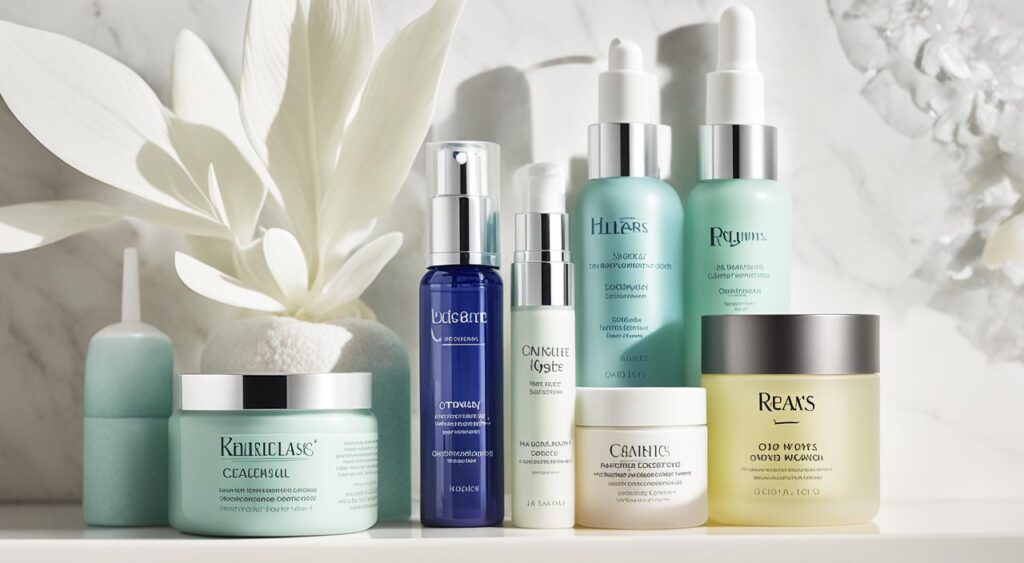
Want an intense skin boost overnight? Try adding an overnight mask to your routine a few nights each week. These night masks are your last step before sleep. They give your skin a big dose of what it needs while you rest.
Overnight masks use special stuff like hyaluronic acid and niacinamide. They deeply hydrate, strengthen your skin’s defense, and fix lines. Some masks have things like lactic acid or retinol for issues like acne or rough skin. Put them on after cleaning your face and leave them alone to soak in all night.
Adding a sleeping mask to your weekly plan can boost your skin’s health. These masks work hard while you sleep. They improve your regular skin care routine with deep repair benefits.
“Adding an overnight mask can change your skin game. It hydrates, repairs, and renews your skin as you sleep.”
Also Read: Best Skin Care Routine For Healthy And Glowing Skin
Conclusion
Creating a good nighttime skincare plan is crucial for beautiful skin. In the evening, your skin doesn’t need protection like in the morning. Instead, it repairs itself. This is when you should clean your face well, use special products, and add plenty of moisture. Doing this helps your skin replace old cells with new ones.
At night, first, remove your makeup. Then, wash your face with a cleanser to get rid of dirt and oil. After that, use a toner, special treatments like retinol, and moisturizer. You can also apply oils or masks. These steps help with various skin issues, like wrinkles, pimples, and uneven color. Stick to this routine every night, and you may see a big improvement in your skin.
Focusing on nighttime skincare is very important. It guides you through steps that help your skin heal and get better. If you follow these suggestions, you might notice healthier, more glowing skin. So, taking care of your skin before bed is worth it for a better overall look.
FAQs
Q: What is a nighttime skincare routine?
A: A nighttime skincare routine is a series of steps you take before going to bed to care for your skin. This routine typically includes cleansing, applying targeted treatments, and moisturizing to help your skin repair and rejuvenate overnight.
Q: Why is a night skincare routine important?
A: A night skincare routine is important because your skin regenerates and repairs itself while you sleep. By using the right products at night, you can help boost this natural process, enhance skin health, and address specific skin concerns.
Q: What are the steps in a night skin care routine?
A: The steps in a night skin care routine usually involve cleansing your face to remove impurities and makeup, applying treatments like serums or retinol, moisturizing to hydrate the skin, and using products that target specific skin concerns like fine lines, wrinkles, or acne.
Q: How do I build a nighttime skincare routine?
A: To build a nighttime skincare routine, start with a gentle cleanser suitable for your skin type, then add targeted treatments like serums or oils, followed by a moisturizer to lock in hydration. It’s important to choose products that suit your skin concerns and avoid ingredients that may irritate your skin.
Q: What are the best nighttime skin care products to use at night?
A: The best nighttime skin care products to use at night may include a gentle cleanser, a hydrating serum, a treatment for specific skin concerns, a moisturizer appropriate for your skin type, and an eye cream to address the delicate skin around your eyes.
Q: How does a night skin care routine benefit your skin?
A: A night skin care routine benefits your skin by providing essential hydration, addressing specific skin concerns, supporting the skin’s natural regeneration process, and helping to maintain a healthy skin barrier. Consistent nighttime skincare can improve the overall appearance and health of your skin.
Q: Can a night skin care routine hydrate your skin?
A: Yes, a night skin care routine can help hydrate your skin by using moisturizers and hydrating serums that lock in moisture overnight. Hydrated skin is essential for maintaining a smooth, plump complexion and preventing issues like dryness or flakiness.
